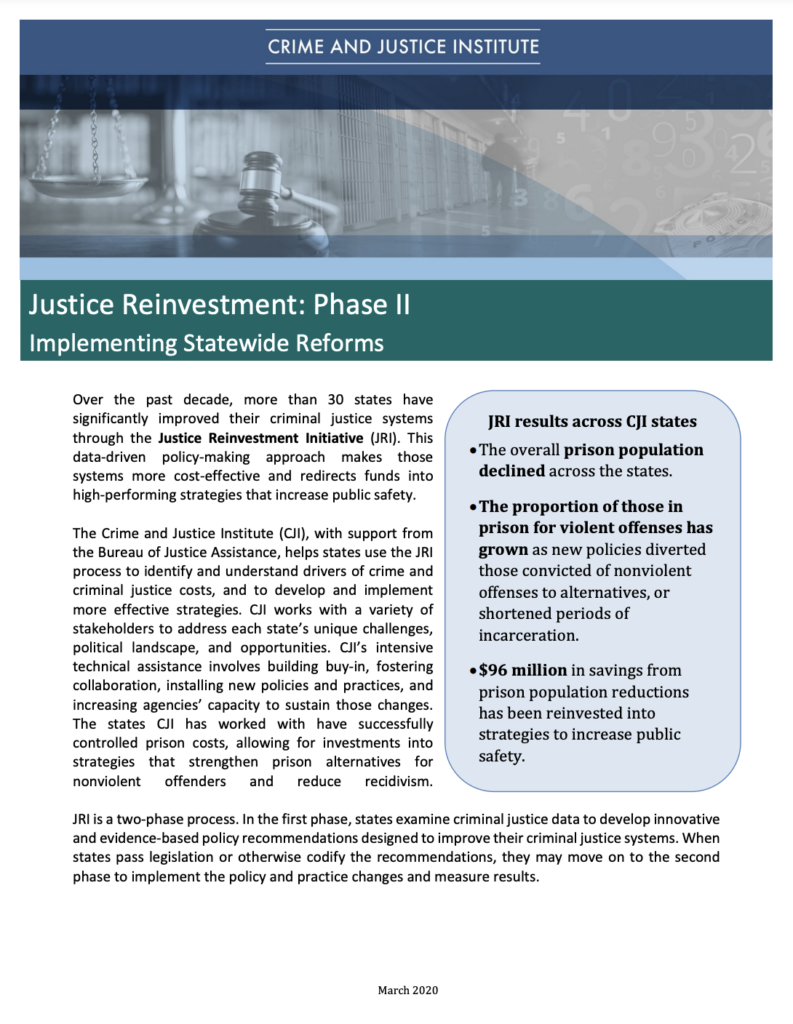Justice Reinvestment: Phase II Implementing Statewide Reforms

Over the past decade, more than 30 states have significantly improved their criminal justice systems through the Justice Reinvestment Initiative (JRI). This data-driven policy-making approach makes those systems more cost-effective and redirects funds into high-performing strategies that increase public safety.
The Crime and Justice Institute (CJI), with support from the Bureau of Justice Assistance, helps states use the JRI process to identify and understand drivers of crime and criminal justice costs, and to develop and implement more effective strategies. CJI works with a variety of stakeholders to address each state’s unique challenges, political landscape, and opportunities. CJI’s intensive technical assistance involves building buy-in, fostering collaboration, installing new policies and practices, and increasing agencies’ capacity to sustain those changes. The states CJI has worked with have successfully controlled prison costs, allowing for investments into strategies that strengthen prison alternatives for nonviolent offenders and reduce recidivism.
JRI results across CJI states
- The overall prison population declined across the states.
- The proportion of those in prison for violent offenses has grown as new policies diverted those convicted of nonviolent offenses to alternatives, or shortened periods of incarceration.
- $96 million in savings from prison population reductions has been reinvested into strategies to increase public safety.
JRI is a two-phase process. In the first phase, states examine criminal justice data to develop innovative and evidence-based policy recommendations designed to improve their criminal justice systems. When states pass legislation or otherwise codify the recommendations, they may move on to the second phase to implement the policy and practice changes and measure results.
JRI implementation varies depending on the unique set of challenges and opportunities in each state. CJI provides individualized support to help states identify and understand which of their agencies’ policies and practices need to change to comply with new legislation or policies.
CJI supports states through various types of implementation assistance, such as:
- Developing and monitoring implementation plans to ensure effective rollout of new policies.
- Educating agency staff and other stakeholders on new requirements and providing the tools, new skills, and support to build capacity to implement and sustain them.
- Developing internal agency policies to meet the new requirements and adopting research-tested approaches that reduce recidivism.
- Measuring the impacts and sharing results with the public.
- Reinvesting in strategies that protect and improve public safety.
Addressing Each State’s Unique Challenges
States have used the JRI process to adopt strategies that reduce recidivism and reinvest savings into programs to improve community safety.
Examples of CJI’s targeted implementation assistance to states include:
- One year into implementing JRI, Louisiana saved $12.2 million by focusing incarceration on serious and violent offenders. CJI helped state leaders establish a grant program to distribute a portion of these savings to community-based programs to reduce recidivism and improve reentry.
- As part of its JRI law, Alaska created a Pretrial Enforcement Division to supervise defendants pretrial. CJI developed and helped institute a pretrial risk assessment to focus bail decisions on risk rather than ability to pay.
- At the request of Maryland’s Division of Field Support Services, CJI conducted a gap analysis of prison programming with the goal of increasing the availability of effective recidivism-reducing interventions.
- In Oklahoma, CJI convened the Department of Corrections and Pardon and Parole Board to create a streamlined administrative parole process and a method for tracking performance.
- Utah was legislatively required to improve community supervision practices. CJI trained staff on effective case management and the use of graduated responses to increase the chances that individuals will successfully complete supervision.
- The JRI legislation in Mississippi required the use of risk assessments to inform decision making and case planning. CJI developed a new and more accurate risk and needs assessment for institutional and community corrections populations.
FOR MORE INFORMATION, CONTACT: BARBARA PIERCE, CRIME AND JUSTICE INSTITUTE, A DIVISION OF COMMUNITY RESOURCES FOR JUSTICE,
AT BPIERCE@CRJ.ORG OR (617) 482-2520
This project was supported by Grant No. 2015-ZB-BX-K002 awarded by the Bureau of Justice Assistance. The Bureau of Justice Assistance is a component of the Department of Justice’s Office of Justice Programs, which also includes the Bureau of Justice Statistics, the National Institute of Justice, the Office of Juvenile Justice and Delinquency Prevention, the Office for Victims of Crime, and the SMART Office. Points of view or opinions in this document are those of the author and do not necessarily represent the official position or policies of the U.S. Department of Justice.

The Crime and Justice Institute, a division of Community Resources for Justice
Boston, MA | www.cjinstitute.org
